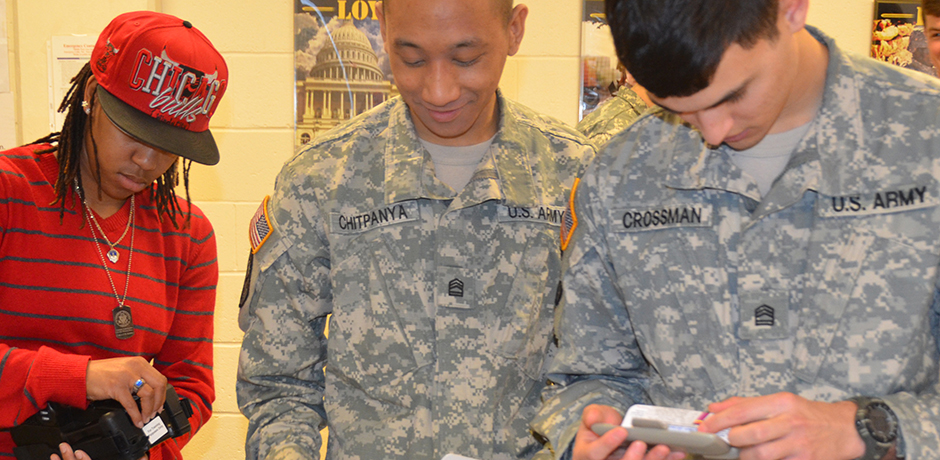MTSU students in the military science program gained real-world exposure to sophisticated technology many of them may use some day.
The ROTC cadets received training in improvised explosive devices, or IEDs, from six U.S. Army Forces Command/Fort Campbell counter IED instructors and site leader Wayne St. Louis Thursday (Jan. 29) inside and outside Forrest Hall and the Forrest Hall Annex.
St. Louis and U.S. Army Master Sgt. Jonathan Bright, an MTSU faculty member, took an idea conceived by Sgt. 1st Class Greg Robinson and brought it to campus for the first time, but, hopefully, not the last. The technology included IED robots, hand-held detection devices, mine or metal detectors and more.
“There’s an average of more than 600 incidents a month around the world,” St. Louis said. “We’re here to teach them (cadets) what to look for.”
All of the cadets were impressed with what they saw or personally experienced in the round-robin sessions.
“These are amazing pieces of technology,” said Tim Maginn, a sophomore aerospace major (with an emphasis in flight dispatch) from Memphis, Tennessee. “It’s really cool they made different types, some you can throw (called Throwbots) to clear a room or an area and some are waterproof and shockproof. I’m happy they save lives, too.”

As others watch, MTSU cadet Tim Maginn, far left, a sophomore from Memphis, Tennessee, receives assistance from improvised explosive devices trainer Jake Holland with an IED robot during the Thursday (Jan. 29) training by members form U.S. Army Forces Command/Fort Campbell counter IED team. (MTSU photos by News and Media Relations)
Joe Bell, a sophomore business management major from Morristown, Tennessee, thought it was “really cool” to know the Fort Campbell personnel were bringing the equipment to MTSU.
“But honestly, I didn’t think I would get to try it out,” he said. “This was really fun. It would be nice to do this more often. It was a cool experience.”
Jake Holland, a Fort Campbell IED trainer from Cadiz, Kentucky, led the session Bell and Maginn were a part of in Forrest Hall Annex.
“We want them to know what’s available to them when they get to their post,” Holland said.
Kera Spray, a sophomore from Shelbyville, Tennessee, and a School of Nursing major, also took part in Holland’s group. But as a sergeant in the Tennessee Army National Guard, she already had experienced the training several times, and could offer assistance and answer other cadets’ questions.

MTSU student cadets Jashara Burns, left, of Camilla, Georgia, Timothy Chitapayna of Nashville and Curtis Crossman of Columbia, Tennessee, hold items on display during the U.S. Army Forces Command/Fort Campbell counter IED training Thursday (Jan. 29) in Forrest Hall.
“I think it’s a good idea (to have the IED training), so the guys that are wanting to be future officers can get an idea of specialties in the Army,” said Spray, who will join the MTSU ROTC program next fall.
One of the Forrest Hall classrooms was utilized for biometrics. Trainer Christopher Siget of Clarksville, Tennessee, told the cadets the enemy can be searched by fingerprint, the iris part of their eyes and photographs.
“The iris (method) is faster and 99 percent accurate,” Siget said.
Another classroom featured ground-penetrating radar, landmine detectors and man portable line charge used for clearing a breach, said trainer John Cameron of Clarksville.
A third classroom included jammers and remote-controlled defeat devices. Bill Craft and Raymond Gibson, both from Clarksville, oversaw this room. David Ward of Clarksville led the outside robot training.
The counter IUD instructors hope to return to MTSU and add other similar programs as training sites when their time allows.
“We’re hoping to make the relationship grow and prosper, and get this information out to our future leaders,” St. Louis said.
— Randy Weiler (Randy.Weiler@mtsu.edu)

MTSU senior cadet Andrew Brown of Camden, Tennessee, checks out the Minehound counter IED, on display in Forrest Hall during training Thursday by the U.S. Army Forces Command/Fort Campbell instruction team. Brown is a construction management major.


COMMENTS ARE OFF THIS POST